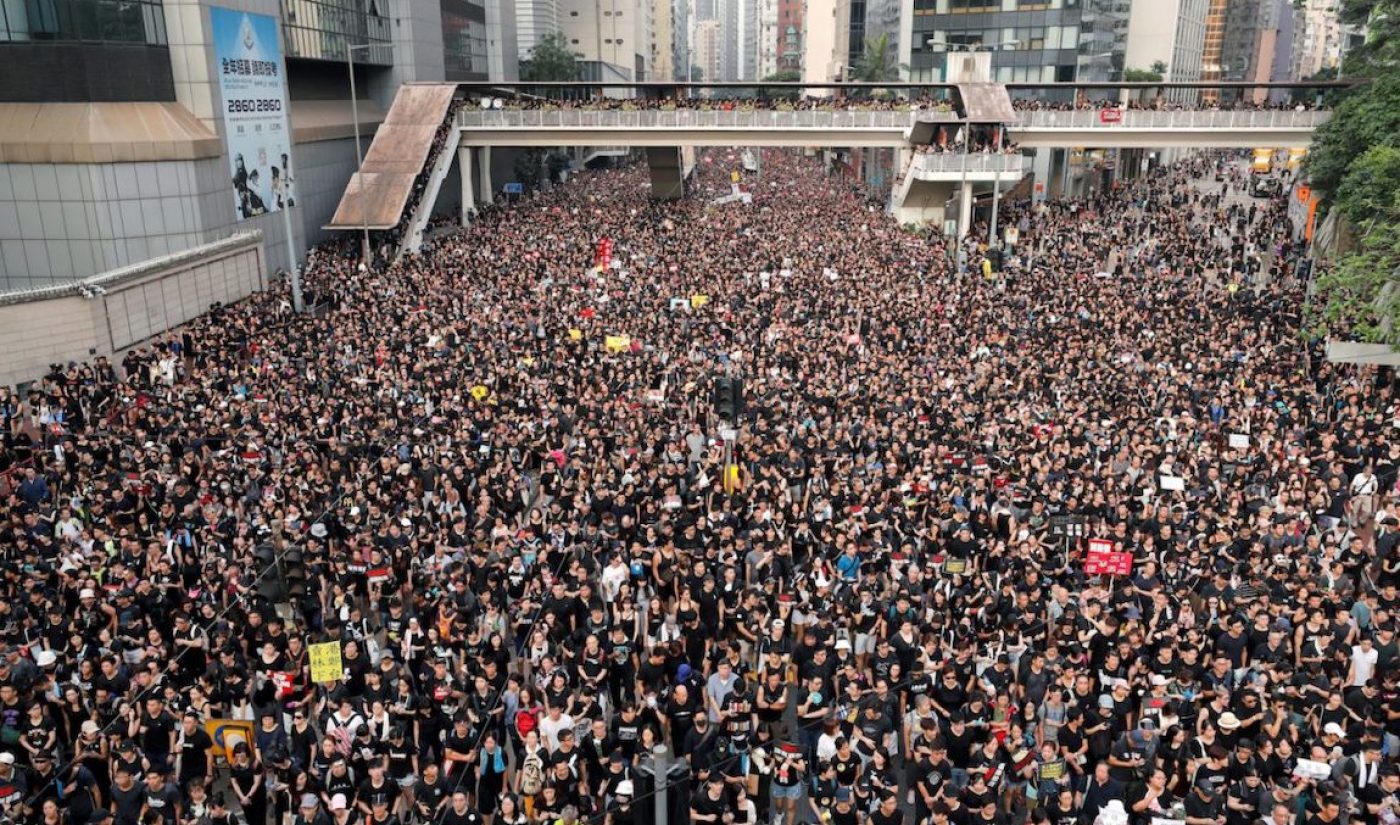Turns out doing business in China is hard. And it’s getting really hard for Western companies that a) want to make billions of dollars in the alluring Chinese market and b) rely on high-profile creative talent to do so. It’s gotten particularly complicated because all that talent keeps having its own opinions on issues like … horrendous political and religious repression.
Such opinions are harshing on the business climate, and it doesn’t look like this trend is going to stop anytime soon. Companies keep wanting to pursue Item A, and keep seeing employees under Item B making corporate life more complicated. But for creators, this will come down to a couple of crucial questions — namely, which side are you on, and is this the hill you want to die on?
It’s all coming at a particularly sensitive time for China. The nation’s formerly booming economy has flattened — a problem when you have 1.4 billion mouths to employ and feed. And minority ethnic and religious groups like the Buddhist Tibetans, Muslim Uighurs, and Falun Gong supporters keep wanting the autonomy to live their lives as they see fit. Of course, most notable of all, the citizens of Hong Kong – one of the world’s most dynamic business centers and at least theoretically autonomous while still within China borders – keep putting on big, noisy, disruptive protests. Seems they don’t want to be under Chinese control any more than the Tibetans, Uighurs or Falun Gong supporters.

Subscribe for daily Tubefilter Top Stories
The Hong Kong protests have attracted a fair amount of international sympathy, most recently when the general manager of the NBA‘s Houston Rockets, Daryl Morey, Tweeted (and soon deleted, but not soon enough) in support of the protesters. The Chinese Basketball Association (CBA) suspended all cooperation with the Rockets, and government-controlled media criticized Morey for his “erroneous comments,” which were, “Fight for Freedom. Stand with Hong Kong.”
This though the Rockets have been one of China’s most popular NBA franchises — thanks originally to the now-retired Yao Ming, who played his pro career with the Rockets. At 7’5″, the former all-star center remains — literally — the biggest sports star in China. And the NBA has become very big in China, too, signing a $1.5 billion deal with Tencent Sports to stream its games there. But that Tweet sent China into a tizzy. Tencent dropped all Rockets games and team news coverage. Other NBA teams’ pre-season exhibitions in China were given their own sometimes-icy reception in the media.
The resulting diplomacy (or non-diplomacy) via Tweets and press releases has been anything but edifying. League officials, coaches, and players all chimed in, then quickly regretted doing so. Regardless of the position they took, tidal waves of criticism washed in on social media, leading to retracted or “clarified” statements, and more generally a messy roundelay of bending over and backpedaling.
If basketball were the only business where all this mess had erupted, it would be a fascinating — if limited — study in the perils of doing big deals with a repressive, nationalistic, and hypersensitive foreign government. But, in fact, it’s just been the beginning of this particular object lesson. Among the recent headlines around this metastasizing mess:
- TikTok banned political ads on its platform, and is believed to have censored videos critical of the Chinese government, according to The Guardian. TikTok is owned by a Chinese company, ByteDance, that is reputed to have close ties to the government. Keep that in mind as your 12-year-old posts her 15th karaoke video of the day. And though TikTok likes to present itself as a safe and fun place for pre-teens, human rights activists say it also has become a place where Chinese propaganda can rear its head, like videos showing happy Uighur children, despite the reality of being orphaned by the political detentions of their parents.
- Google deleted a video game where players act as Hong Kong protesters. The game violated Google rules against showing “sensitive events” and profiting off of “serious ongoing conflicts or tragedies,” The Wall Street Journal reported. That happened right after…
- Apple deleted, un-deleted, then permanently re-deleted an app, HKmap.live, that protesters used to track the presence of police. The on-and-off deletion came as the government-owned People’s Daily newspaper criticized Apple for helping Hong Kong “rioters,” according to The New York Times.
- Apple, which sells tens of millions of iPhones and other gear in China, also got beat up for asking show creators for its soon-to-launch Apple TV+ service to avoid presenting China in a “bad light,” according to BuzzFeed. And then there were reports that some user browsing data on Apple devices was shared by an app with the Chinese government.
- Game giant Activision Blizzard banned a Hearthstone player who vocally supported Hong Kong supporters during a live stream. The initial one-year ban was cut to six months, and the player’s prize winnings were restored, but only after another tidal wave of criticism. Like the NBA, Blizzard has bet big on China — nowhere moreso than in esports, where its burgeoning Overwatch League has expensive franchises based in Shanghai, Chengdu, Guangzhou, and Hangzhou.
- ESPN told its reporters in a memo not to bring up the Hong Kong protests or China when they cover Morey, the Rockets’ executive. ESPN’s SportsCenter also used a map controversially showing internationally-disputed territories as belonging to China.
- As if to emphasize how contentious those disputed territories can be, Vietnam banned Abominable, a new animated film from Comcast’s DreamWorks unit, because it showed a map that put some of the territories (in the South China Sea) under Chinese control. That’s apparently good business if you want to get into the Chinese market, but not always so good elsewhere.
- Nike, which made a big deal out of supporting former NFL quarterback Colin Kaepernick for his National Anthem protests, is a little more circumspect when it comes to China. The company instructed workers in at least five of its Chinese stores to remove all Rockets merchandise from shelves, according to Reuters.
- Comedy Central show South Park was banned in China, after making a typically snarky episode called Band In China. After the ban, show creators Matt Parker and Trey Stone issued, you guessed it, a typically snarky “apology” Tweet that also included a link to the offending episode. The tweet received more than 104,000 likes.
Keeping track of all these messes, which are kind of related, is overwhelming. And think what it’s like for brands and brand managers. They’ve been told for some time now that today’s young customers expect companies to take a stand on important issues. I know, because I’ve been doing some of the telling. That’s a complicated line to walk for companies that sell stuff, like Nike. And for content companies like Viacom, Comcast, and Disney (the respective owners of of Comedy Central, DreamWorks, and ESPN) — as well as Apple, Activision, and Google — it’s about to get a bit crazy, I think.
That’s because they all rely on creative talent who are known to take maverick, noisy stands in favor of the causes that matter to them. With social media, personal video, and so much else, these creators reach large audiences of intensely engaged fans. Now, companies are about to lurch into an era where the creative talent so important to their creative output may get in the way of their bigger corporate priorities.
It’s going to be a challenge for talent, too, as some of the NBA’s biggest stars have been finding out lately. If you’re going to work with China (or Russia, or Turkey, or Syria, for instance) and with creative talent, you better figure out which hill you want to die on. Because you may end up dying a lot in this hyper-mediated, hyper-critical age.








